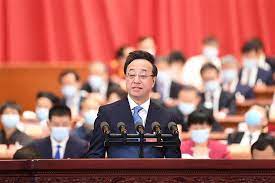By Tu Haiming
The results of the talent attraction programs launched by the Hong Kong Special Administrative Region government have been promising so far. As of June, half a year following their introduction, the SAR government had received more than 100,000 applications, almost three times the annual target to import 35,000 professionals. The overwhelming response is a testimony to Hong Kong’s allure.
The Top Talent Pass Scheme (TTPS) was launched by the incumbent administration shortly after its inauguration, with the aim of addressing the recent brain drain problem bottlenecking Hong Kong’s development. Since Hong Kong and the Chinese mainland resumed quarantine-free travel in January, the SAR government has stepped up efforts in its quest for global talent. The unexpectedly high turnout is like a shot in the arm.
The TTPS is a core initiative in Hong Kong’s drive to attract talent. As of the end of May, more than 32,000 individuals had applied for TTPS admission, of whom more than 21,000 have been approved. Most of the applicants are from the Chinese mainland, and individuals aged 18 to 30 form the largest group. Among the categories of applicants, B-tier talent, people who have obtained a bachelor’s degree from any of the world’s top 100 universities and have accumulated at least three years’ work experience in the five years prior to application, make up most of the candidates. Combined with the admissions under other talent programs, total talent admissions in the first five months of this year reached 49,000, exceeding the annual target of 35,000.
These figures attest to Hong Kong’s attraction for professionals. In particular, Hong Kong boasts distinctive advantages in three areas.
First, Hong Kong is a highly internationalized city and a melting pot of elites from all over the world. Many of the world’s top 500 companies have stationed their Asia-Pacific headquarters in the city. In the minds of a lot of young professionals, Hong Kong is a gold mine of opportunities and provides a world-class entrepreneurial platform.
The second advantage is Hong Kong’s superior business environment. Thanks to its status as a free port, the city’s economic vitality is beyond comparison. Many aspiring young individuals consider employment in Hong Kong as a step onto a career path without limits.
The third advantage is the privileged identity of Hong Kong permanent residency, which grants the passport holder visa-free access to 168 countries and regions worldwide, lower academic requirements for admission to prestigious schools, more medical subsidies, and a tax ceiling of 15 percent, all of which are enticing perks for potential residents of all ages.
Some crude propaganda intended to malign the National Security Law for Hong Kong (NSL), has claimed that its promulgation has weakened the city’s attractiveness to global professionals. The falsity of such a claim is now exposed by the overwhelming response to the TTPS and other talent admission programs. Indeed, the NSL has no impact on law-abiding residents, whose work and life in Hong Kong has not been affected or disturbed in any sense.
Chief Executive John Lee Ka-chiu recently disclosed that the SAR government is preparing to further relax the requirements for talent admission, suggesting there is still a large talent gap.
As Hong Kong’s economy rebounded in the wake of the three-year pandemic, the city suddenly found itself grappling with a talent crunch, especially in the aviation and construction sectors. Meanwhile, the national 14th Five Year Plan (2021-25) designated Hong Kong’s role as “eight centers”: international financial center; international innovation and technology center; international cultural exchange center; international trade center; international shipping center; international aviation hub; center for international legal and dispute resolution services in the Asia-Pacific region; and regional intellectual property trading center. All these developments require a lot of professionals.
While stepping up its efforts to attract professionals, Hong Kong must also strive to retain them. The provision of affordable housing remains a top priority in this regard as the city’s exorbitant house prices remain a prime discouragement to professionals.
Besides, there is room for improvement of the city’s living environment, with the inordinately high population density of central urban areas being a case in point. Hopefully, the development of the Northern Metropolis will help divert some residents from central urban areas. Hong Kong should also step up its cooperation with Guangdong province to bring the “one-hour living circle” in the Greater Bay Area to fruition, and jointly develop a “cultural bay area” to create a more livable environment that will increase Hong Kong’s appeal to global professionals.
In his maiden Policy Address last October, John Lee announced the launch of the Office for Attracting Strategic Enterprises, followed by the establishment of the Co-Investment Fund of HK$30 billion ($3.8 billion) to support firms. It is expected that the government will also provide support in the areas of land and human resources.
The government aims to get at least 1,130 companies to set up or expand their businesses in Hong Kong between 2023 and 2025. Around 186 companies have already set foot in Hong Kong this year.
Without the necessary professionals, it will be difficult to revive Hong Kong’s industries; without distinguished enterprises, it is difficult to retain professionals. Therefore, the hunt for talent has to go hand-in-hand with the quest for world-class enterprises.
The author is vice-chairman of the Committee on Liaison with Hong Kong, Macao, Taiwan and Overseas Chinese of the National Committee of the Chinese People’s Political Consultative Conference and chairman of the Hong Kong New Era Development Thinktank. The views do not necessarily reflect those of Bauhinia Magazine.
Source: China Daily
https://res.youuu.com/zjres/2023/8/26/OaWu9wN23qaBS40dhqIWvC7tOaDl12Qg0vD.jpeg











掃描二維碼分享到手機














